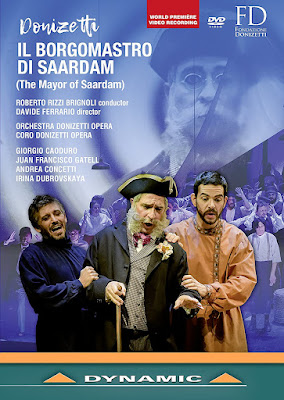The wikipedia page for Zar und Zimmermann mentions that Donizetti did an opera based on the same play, and suddenly it became extremely vital that I see as many operas as possible about Peter the Great as a carpenter. Imperative! Fortunately, it turned out there was a DVD of this one. Obviously.
The plot? Well...it's basically the same as the Lortzing. What else would you expect? There are a few differences, though. Here, Marietta, the mayor's daughter in Lortzing, is his "ward," whatever background that may imply (the wikipedia entry currently claims otherwise, but it's just wrong). The mayor does have a daughter, Carlotta, but she's a very minor character. Also, the international intrigue is significantly toned down; where in the Lortzing there were, like, three ambassadors from different countries running around and causing confusion, here it's pared down to just the one (who also plays a much smaller role than any of them). But regardless of any of this, it's still fun on a bun! How could it not be?!
I realized that this is one of the earliest Donizetti operas I've seen. I mean, he's already written like a dozen of them, but he was hella prolific. The only earlier one I've seen is Don Gregorio. But regardless, that Donizetti spark shines through. The music sounds very...Donizetti-an. What a great tautology. I liked it a lot, and this performance makes a few really good choices which address possible issues with the text: the climax is a bit protracted, with one chorus and aria after the other, and you think okay, dude. This isn't necessarily dramatically effective. Here, during Marietta's final bit of singing, we see everyone else looking on, clearly impatient with the proceedings and itching just to get on with it. That's fun. Another, bigger thing that's fun is what they do with the character of Carlotta: as I said, it's a small role, and you sort of wonder why the opera even bothers with it. Shouldn't she have a love interest too? Two of those is normally the way these things go! Especially because early on there's a thing where Pietro (Marietta's amour) is remonstrating with the Tsar: yeah, you can make fun of me, but someday you'll fall in love, and then you'll see. And he's all, ho ho, that will never happen, and okay, that's a very obvious indication that it WILL happen, innit? But...nope! Granted, it would be unusual for the secondary romance to involve characters of higher social class...well, nothing to be done about the Tsar, but in this production, there's an entirely mimed romance between Carlotta and his assistant Filiberto. In the last scene she's set to marry some random dude; that is in the libretto, a bit, but the plot thread is just sort of forgotten about, so we get an argument and Carlotta angrily remonstrating with her father in the background until finally at the last moment she breaks away and goes off with the Russians. It's very well-done and not at all overplayed. Normally I'm against adding extraneous plot elements to operas, but this works so well you can't complain.
Anyway! Donizetti: in my opinion, he wrote operas, and this, I believe, is one of them.





